六年级英语下册随堂笔记.doc
- 格式:doc
- 大小:182.50 KB
- 文档页数:31
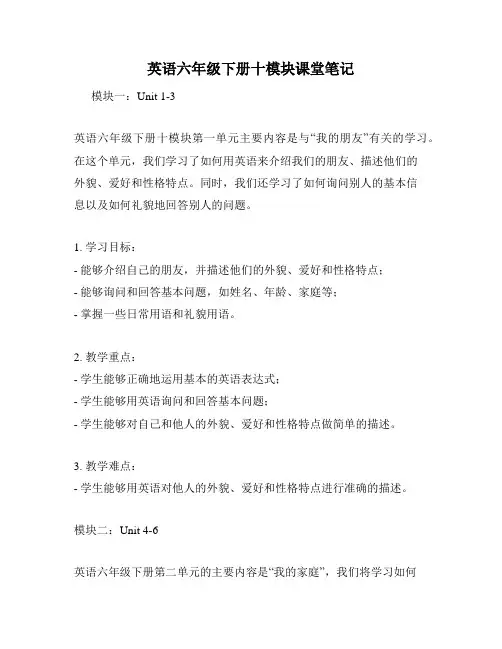
英语六年级下册十模块课堂笔记模块一:Unit 1-3英语六年级下册十模块第一单元主要内容是与“我的朋友”有关的学习。
在这个单元,我们学习了如何用英语来介绍我们的朋友、描述他们的外貌、爱好和性格特点。
同时,我们还学习了如何询问别人的基本信息以及如何礼貌地回答别人的问题。
1. 学习目标:- 能够介绍自己的朋友,并描述他们的外貌、爱好和性格特点;- 能够询问和回答基本问题,如姓名、年龄、家庭等;- 掌握一些日常用语和礼貌用语。
2. 教学重点:- 学生能够正确地运用基本的英语表达式;- 学生能够用英语询问和回答基本问题;- 学生能够对自己和他人的外貌、爱好和性格特点做简单的描述。
3. 教学难点:- 学生能够用英语对他人的外貌、爱好和性格特点进行准确的描述。
模块二:Unit 4-6英语六年级下册第二单元的主要内容是“我的家庭”,我们将学习如何介绍我们的家人、描述他们的外貌、爱好和性格特点。
同时,我们还将学习一些有关家族历史和文化的知识。
1. 学习目标:- 能够介绍自己的家人,并描述他们的外貌、爱好和性格特点;- 能够了解自己和他人的家族历史和文化;- 能够正确运用一些日常用语和礼貌用语。
2. 教学重点:- 学生能够正确地运用英语表达式;- 学生能够用英语描述和介绍自己的家庭;- 学生能够了解家族历史和文化。
3. 教学难点:- 学生能够用英语对自己和他人的家族历史和文化进行准确的描述。
模块三:Unit 7-9英语六年级下册第三单元的主要内容是“我的学校”,我们将学习如何介绍自己的学校,包括学校的位置、建筑、课程、教师、学生等。
同时,我们还将学习如何用英语进行简单的日常交流。
1. 学习目标:- 能够介绍自己的学校,并描述学校的位置、建筑、课程、教师、学生等;- 能够运用常用的日常交流语言;- 能够了解学校文化和校规校纪。
2. 教学重点:- 学生能够正确地运用英语表达式;- 学生能够描述和介绍自己的学校;- 学生能够正确用英语进行日常交流。
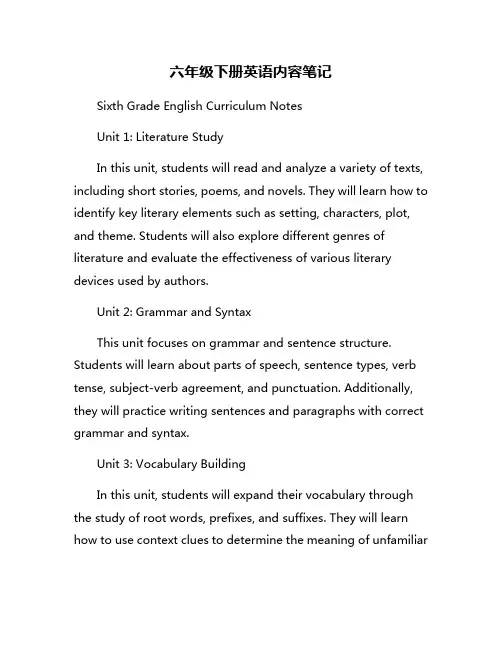
六年级下册英语内容笔记Sixth Grade English Curriculum NotesUnit 1: Literature StudyIn this unit, students will read and analyze a variety of texts, including short stories, poems, and novels. They will learn how to identify key literary elements such as setting, characters, plot, and theme. Students will also explore different genres of literature and evaluate the effectiveness of various literary devices used by authors.Unit 2: Grammar and SyntaxThis unit focuses on grammar and sentence structure. Students will learn about parts of speech, sentence types, verb tense, subject-verb agreement, and punctuation. Additionally, they will practice writing sentences and paragraphs with correct grammar and syntax.Unit 3: Vocabulary BuildingIn this unit, students will expand their vocabulary through the study of root words, prefixes, and suffixes. They will learn how to use context clues to determine the meaning of unfamiliarwords and explore strategies for memorizing and retaining new vocabulary words.Unit 4: Writing SkillsStudents will develop their writing skills in this unit by focusing on various forms of writing, such as narratives, expository essays, and persuasive essays. They will learn how to structure their writing, develop ideas, and use descriptive language to engage their readers.Unit 5: Speaking and ListeningThis unit emphasizes effective communication skills, including public speaking, active listening, and group discussions. Students will practice presenting information clearly and confidently, as well as responding to questions and feedback from their peers.Unit 6: Research and InquiryIn the final unit, students will learn how to conduct research and gather information from credible sources. They will practice citing sources, taking notes, and organizing information to write a research report on a chosen topic.Overall, the sixth grade English curriculum aims to develop students' reading, writing, speaking, and listening skills whilecultivating a deeper appreciation for literature and language. By the end of the school year, students will have a solid foundation in English language arts that will prepare them for future academic success.。

主题:六年级下册英语单元a课堂笔记一、Unit 11. 本单元主要学习介绍自己、家人和朋友,并学习有关人物的描述词汇和句型。
2. 通过课堂练习,学生能够掌握正确使用形容词描述人物外貌和性格特征。
3. 学生需要掌握一些基础的单词拼写和语法知识,例如动词的第三人称单数形式和简单的句型构造。
二、Unit 21. 本单元主要学习有关衣服和服饰的词汇,以及如何表达自己对衣服的喜好。
2. 通过课堂活动,学生能够在实际情境中练习使用衣服和颜色的描述词汇。
3. 本单元还包含一些实用的日常用语和情景会话,帮助学生提高实际口语应用能力。
三、Unit 31. 本单元将学习关于家庭和家务的词汇,学生能够描述自己家庭成员以及每个人的家务分工。
2. 通过课堂练习,学生将学会运用家庭成员和家务动作的词汇,构造简单的句子描述家庭生活和分工情况。
3. 本单元还将通过课堂游戏和角色扮演,帮助学生提高口语交流能力和团队合作能力。
四、Unit 41. 本单元将学习有关食物和饮料的词汇,学生能够描述自己喜欢的食物和饮料,并表达食物的口感和味道。
2. 通过课堂活动,学生将学会在实际情境中讨论食物偏好,并学习一些常用的餐厅用语和点餐对话。
3. 本单元还包含一些与食物相关的文化知识和风俗习惯,帮助学生了解不同国家和地区的饮食习惯和饮食文化。
五、Unit 51. 本单元将学习有关动物和自然界的词汇,学生能够描述自己喜欢的动物和环保意识。
2. 通过课堂练习,学生将学会用英语描述动物的外貌特征和生活习性,并能够参与有关动物保护和环保的讨论。
3. 本单元还将通过学习一些与自然和环境保护相关的诗歌和歌曲,帮助学生了解自然界的美好并培养环保意识。
通过以上的课堂笔记,我们可以清晰地了解到六年级下册英语单元a的课程安排和学习目标。
这些内容涵盖了学生在日常生活中所需要用到的基础英语词汇和语法知识,同时也注重培养学生的口语交流能力和团队合作意识。
希望学生们能够在老师的指导下,认真学习每个单元的内容,积极参与课堂活动,提高英语水平,为将来的学习和工作打下坚实的基础。
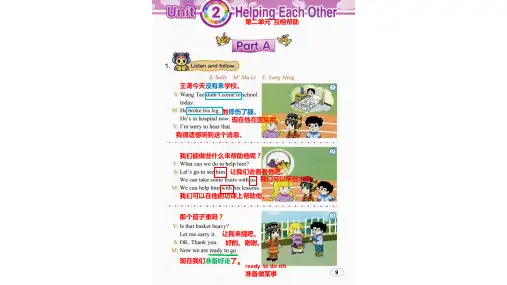
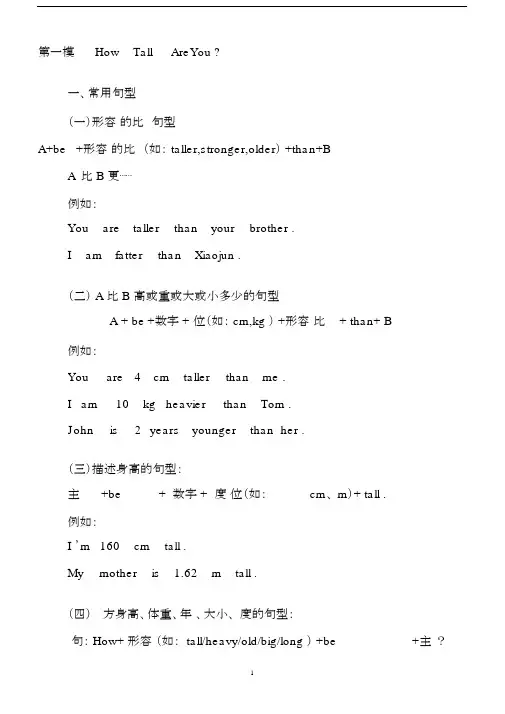
第一模How Tall Are Y ou ?一、常用句型(一)形容的比句型A+be+形容的比(如: taller,stronger,older) +than+BA比 B 更⋯⋯例如:You are taller than your brother .I am fatter than Xiaojun .(二) A 比 B 高或重或大或小多少的句型A + be+数字 +位(如: cm,kg ) +形容比 + than+ B例如:You are4cm taller than me .I am10kg heavier than Tom .John is2years younger than her .(三)描述身高的句型:主+be+ 数字 + 度位(如:cm、 m)+ tall .例如:I ’m 160 cm tall .My mother is 1.62 m tall .(四)方身高、体重、年、大小、度的句型:句: How+ 形容(如: tall/heavy/old/big/long ) +be+主?答句:主语+be 动词+ 数字 + 单位(如: cm/kg/years)+ 形容词.例如:How tall are you ?I ’m 160 cm tall .(五)形容词比较级的变化规则构成方法规一般在词尾加er则变化以字母 e 结尾的词,加r。
末尾只有一个辅音字母的重读闭音节词,应先双写这个辅音字母,再加 er。
以y 结尾,并且 y 前面是辅音字母的词,先把 y 变为 i,再加 er。
不规则变原级比较级tall taller high higher short shorter strong stronger young younger fine finer late laterfat fatter big bigger thin thinner easy easier funny funnier heavy heavier good better bad/ill worse many/much more little less化(六)如何用“how” 体貌How tall are you ?How old are you ?How heavy is your brother ?How long is its tail ?How big are your hands ?(七)“one”做代的用法one 是数字“一”的意思,但有用它做代,用来代替上文中已出的,以避免重复。
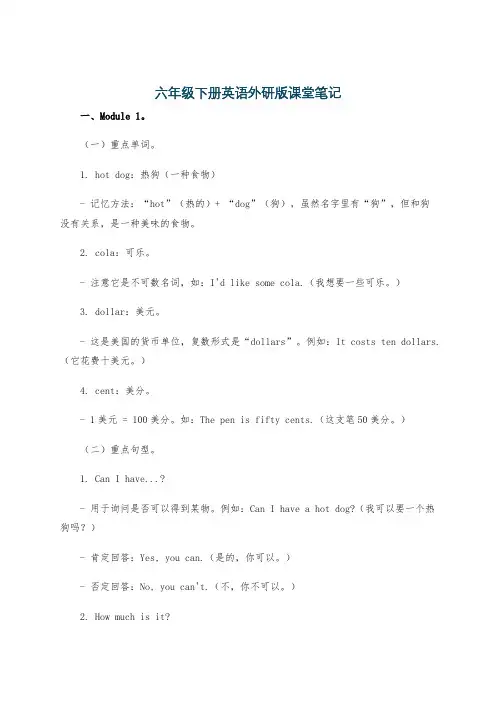
六年级下册英语外研版课堂笔记一、Module 1。
(一)重点单词。
1. hot dog:热狗(一种食物)- 记忆方法:“hot”(热的)+ “dog”(狗),虽然名字里有“狗”,但和狗没有关系,是一种美味的食物。
2. cola:可乐。
- 注意它是不可数名词,如:I'd like some cola.(我想要一些可乐。
)3. dollar:美元。
- 这是美国的货币单位,复数形式是“dollars”。
例如:It costs ten dollars.(它花费十美元。
)4. cent:美分。
- 1美元 = 100美分。
如:The pen is fifty cents.(这支笔50美分。
)(二)重点句型。
1. Can I have...?- 用于询问是否可以得到某物。
例如:Can I have a hot dog?(我可以要一个热狗吗?)- 肯定回答:Yes, you can.(是的,你可以。
)- 否定回答:No, you can't.(不,你不可以。
)2. How much is it?- 用来询问物品的价格。
例如:How much is the cola?(可乐多少钱?)- 回答:It's...(它是……),后面可以接具体的价格,如:It's three dollars.(它是三美元。
)二、Module 2。
(一)重点单词。
1. duck:鸭子。
- 复数形式是“ducks”。
可以说:There are some ducks in the pond.(池塘里有一些鸭子。
)2. noisy:吵闹的。
- 形容词,用来形容环境或声音很吵闹。
例如:The market is noisy.(市场很吵闹。
)3. peace:和平;太平。
- 例如:We all hope for world peace.(我们都希望世界和平。
)4. wide:宽的。
- 反义词是“narrow”(窄的)。
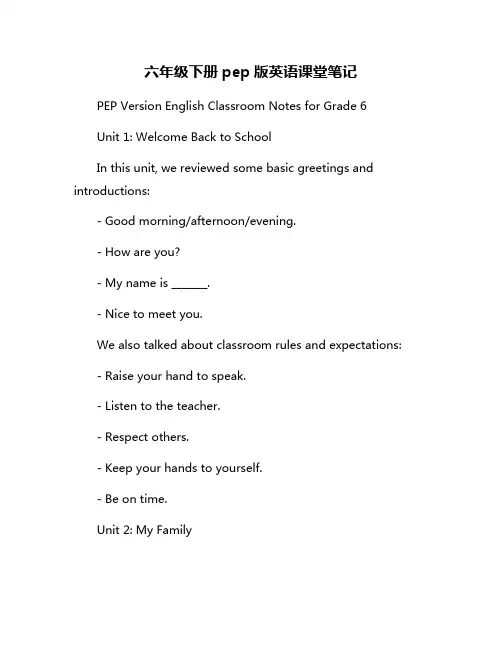
六年级下册pep版英语课堂笔记PEP Version English Classroom Notes for Grade 6Unit 1: Welcome Back to SchoolIn this unit, we reviewed some basic greetings and introductions:- Good morning/afternoon/evening.- How are you?- My name is _______.- Nice to meet you.We also talked about classroom rules and expectations:- Raise your hand to speak.- Listen to the teacher.- Respect others.- Keep your hands to yourself.- Be on time.Unit 2: My FamilyIn this unit, we learned how to talk about our family members:- This is my mother/father/brother/sister.- I have a big family.- I love spending time with my family.We also learned some new vocabulary related to family members, such as grandparents, aunt, uncle, and cousin.Unit 3: My HomeIn this unit, we learned how to describe our homes:- I live in a house/apartment.- My house has a living room, kitchen, bedrooms, and bathrooms.- I love my home.We also learned some new vocabulary related to rooms in the house, furniture, and household items.Unit 4: My SchoolIn this unit, we talked about our school life:- I go to school from Monday to Friday.- My favorite subject is English/Math/Science.- I have many friends at school.We also learned some new vocabulary related to school subjects, school activities, and items in the classroom.Unit 5: My HobbiesIn this unit, we learned how to talk about our hobbies and interests:- I like reading/drawing/swimming.- My hobby is playing basketball/piano.- I enjoy spending time with my friends.We also learned some new vocabulary related to different hobbies and leisure activities.Overall, this semester has been a fun and educational journey. We have learned a lot of new vocabulary, grammar structures, and communication skills. I look forward to continuing to improve my English in the next semester.。
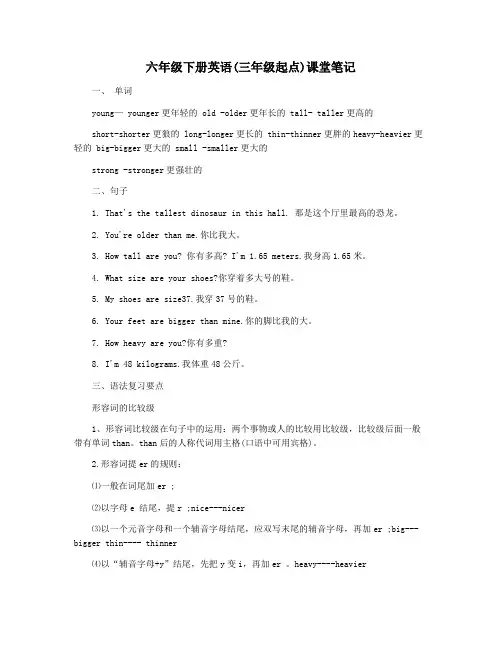
六年级下册英语(三年级起点)课堂笔记一、单词young— younger更年轻的 old -older更年长的 tall- taller更高的short-shorter更狼的 long-longer更长的 thin-thinner更胖的heavy-heavier更轻的 big-bigger更大的 small -smaller更大的strong -stronger更强壮的二、句子1. That's the tallest dinosaur in this hall. 那是这个厅里最高的恐龙。
2. You're older than me.你比我大。
3. How tall are you? 你有多高? I'm 1.65 meters.我身高1.65米。
4. What size are your shoes?你穿着多大号的鞋。
5. My shoes are size37.我穿37号的鞋。
6. Your feet are bigger than mine.你的脚比我的大。
7. How heavy are you?你有多重?8. I'm 48 kilograms.我体重48公斤。
三、语法复习要点形容词的比较级1、形容词比较级在句子中的运用:两个事物或人的比较用比较级,比较级后面一般带有单词than。
than后的人称代词用主格(口语中可用宾格)。
2.形容词提er的规则:⑴一般在词尾加er ;⑵以字母e 结尾,提r ;nice---nicer⑶以一个元音字母和一个辅音字母结尾,应双写末尾的辅音字母,再加er ;big--- bigger thin---- thinner⑷以“辅音字母+y”结尾,先把y变i,再加er 。
heavy----heavier3.不规则形容词比较级: good/well-better例句:(1).It's taller than both of us together.它比我俩提出来还低。
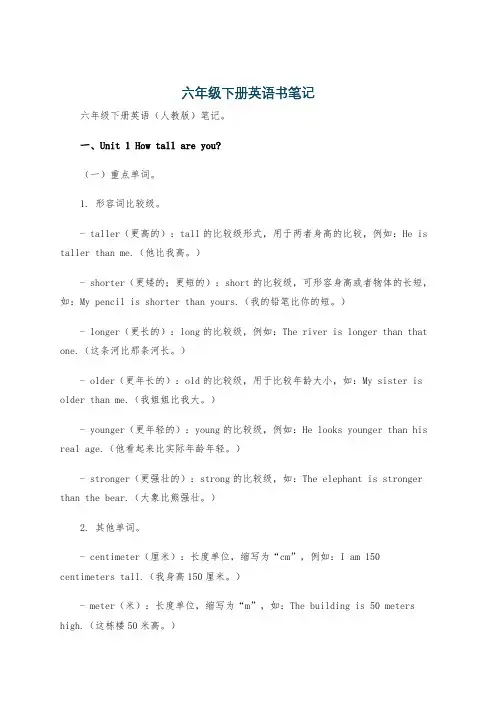
六年级下册英语书笔记六年级下册英语(人教版)笔记。
一、Unit 1 How tall are you?(一)重点单词。
1. 形容词比较级。
- taller(更高的):tall的比较级形式,用于两者身高的比较,例如:He is taller than me.(他比我高。
)- shorter(更矮的;更短的):short的比较级,可形容身高或者物体的长短,如:My pencil is shorter than yours.(我的铅笔比你的短。
)- longer(更长的):long的比较级,例如:The river is longer than that one.(这条河比那条河长。
)- older(更年长的):old的比较级,用于比较年龄大小,如:My sister is older than me.(我姐姐比我大。
)- younger(更年轻的):young的比较级,例如:He looks younger than his real age.(他看起来比实际年龄年轻。
)- stronger(更强壮的):strong的比较级,如:The elephant is stronger than the bear.(大象比熊强壮。
)2. 其他单词。
- centimeter(厘米):长度单位,缩写为“cm”,例如:I am 150 centimeters tall.(我身高150厘米。
)- meter(米):长度单位,缩写为“m”,如:The building is 50 meters high.(这栋楼50米高。
)- kilogram(千克;公斤):重量单位,缩写为“kg”,例如:This bag weighs 5 kilograms.(这个包重5公斤。
)(二)重点句型。
1. 询问身高、长度等。
- How tall are you?(你有多高?)- I'm 1.65 meters.(我身高1.65米。
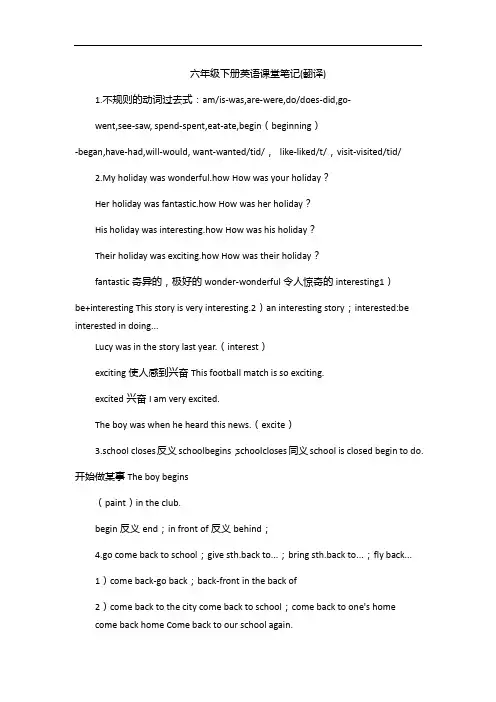
六年级下册英语课堂笔记(翻译)1.不规则的动词过去式:am/is-was,are-were,do/does-did,go-went,see-saw, spend-spent,eat-ate,begin(beginning)-began,have-had,will-would, want-wanted/tid/,like-liked/t/,visit-visited/tid/2.My holiday was wonderful.how How was your holiday?Her holiday was fantastic.how How was her holiday?His holiday was interesting.how How was his holiday?Their holiday was exciting.how How was their holiday?fantastic奇异的,极好的wonder-wonderful令人惊奇的interesting1)be+interesting This story is very interesting.2)an interesting story;interested:be interested in doing...Lucy was in the story last year.(interest)exciting使人感到兴奋This football match is so exciting.excited兴奋I am very excited.The boy was when he heard this news.(excite)3.school closes反义schoolbegins;schoolcloses同义school is closed begin to do.开始做某事The boy begins(paint)in the club.begin反义end;in front of反义behind;4.go come back to school;give sth.back to...;bring sth.back to...;fly back...1)come back-go back;back-front in the back of2)come back to the city come back to school;come back to one's homecome back home Come back to our school again.3)to的用法:turn to the left;from..to..;ten to one;give..to..;to do….(动词不定式)4)return to..指人返回到..give sth back to..指物返回到..You can have this book for two days.But you must give it back to me省略)s0on5.enjoy oneself=have a good time have a lot of fun/have much fun enjoy oneself myself,yourself,herself,himself,itself,yourselves, ourselves,themselves)I)You should do it by(依靠)(you)。
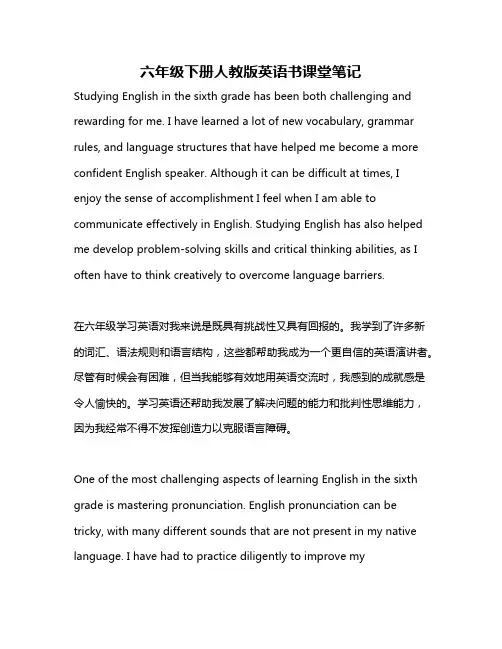
六年级下册人教版英语书课堂笔记Studying English in the sixth grade has been both challenging and rewarding for me. I have learned a lot of new vocabulary, grammar rules, and language structures that have helped me become a more confident English speaker. Although it can be difficult at times, I enjoy the sense of accomplishment I feel when I am able to communicate effectively in English. Studying English has also helped me develop problem-solving skills and critical thinking abilities, as I often have to think creatively to overcome language barriers.在六年级学习英语对我来说是既具有挑战性又具有回报的。
我学到了许多新的词汇、语法规则和语言结构,这些都帮助我成为一个更自信的英语演讲者。
尽管有时候会有困难,但当我能够有效地用英语交流时,我感到的成就感是令人愉快的。
学习英语还帮助我发展了解决问题的能力和批判性思维能力,因为我经常不得不发挥创造力以克服语言障碍。
One of the most challenging aspects of learning English in the sixth grade is mastering pronunciation. English pronunciation can be tricky, with many different sounds that are not present in my native language. I have had to practice diligently to improve mypronunciation and try to mimic native speakers as closely as possible. It can be frustrating at times, but I remind myself that progress takes time and effort. I have found that listening to English music and watching English movies has helped me become more familiar with the pronunciation of words.在六年级学习英语最具挑战性的一点是掌握发音。
六年级下册英语书课堂笔记English: Taking notes in the English class is essential for students to review and retain information learned during the lesson. It helps them remember key points and concepts.Chinese: 在英语课上做笔记对学生来说至关重要,帮助他们复习和记住课堂上学到的知识。
这有助于他们记住重点和概念。
English: When taking notes, students should focus on writing down important information such as definitions, examples, and key vocabulary words. This will help them later when studying for exams or quizzes.Chinese: 学生在做笔记时,应该专注于写下重要信息,比如定义、例子和关键词汇。
这将有助于他们在后来复习考试或小测验时使用。
English: Additionally, taking notes can also improve students' listening skills as they have to pay attention to what the teacher is saying in order to write it down accurately. This active participation in class can enhance their overall understanding of the subject.Chinese: 此外,做笔记还可以提高学生的听力技能,因为他们必须专注于老师说的内容,才能准确地记录下来。
六年级下册英语课堂笔记湘少版Unit 1You're goodl al drawing, Peler.1. be good at.....拉长于...-(1)后接动名词I am good at swimming.(2后接名词l am good at English.What are you good at?l am good at.....What are you not good at?l am not good at....w hat is your best friend good at?; what is Anne : Peter good at?She ; He is good at......What clo you like doing?你喜欢做什么?l like watching films.2. Do you......?如: Do yau like fishing? Yes,I do.'No,I don't.Unit 2Anne wanted to skate.( l )want to .......想要....(后接动词原形)wWhat do you want to do?你想要干什么?want to fly a kite.第人称What does Peterishe want to do?l'eter:'She wants to read a book.过去时态What did he want to do?ITewanted to play compuler gamcs.( 2 ) try to .......努力、尝试做.... (.i接动词原形) Lingling try to skate.Unit 3 Have you got enough money?( 1 )IIave you got .......?你有........?TIave yiu got enough mney?你有足够的钱吒?Yes,1 have. i No,1 haven't.( 2)一般疑问句《过去时态)Was the dictionary small enough?这宁典够小吗?Yes,it was.i No, it was not.( 3 y enough和l too的用法enough用来修饰形容词,放在.形容词后面.useful enough足够有用用来修饰i名词时,放在.前面.enough money足够的钱too用来修饰形容词,痰在形容词前面too cheap太便宜too expensive 太贵(4 ) Mr L.i wanicd lu buy a camcTa. Bul h did nol have cenough moncy.He had enough money.Unit 4Our earth looks like this from space.( l ) be interested in......对..感兴趣.. l am interested in space/playing football.。
六年级下册英语书课堂笔记人教版English:In the sixth grade English textbook, students will learn a variety of topics including daily routines, hobbies, festivals, and environmental protection. The students will be taught how to talk about their daily routines, express likes and dislikes for different activities, describe festivals and celebrations, and discuss ways to protect the environment. Through activities, discussions, and reading materials, the students will develop their listening, speaking, reading, and writing skills in English. The textbook also includes grammar and vocabulary exercises to help students improve their language proficiency. Overall, the curriculum aims to provide a comprehensive and engaging learning experience for students to learn and practice English.中文翻译:在六年级英语课本中,学生将学习各种主题,包括日常生活、爱好、节日和环境保护。
人教六年级下册英语课堂笔记English:In the sixth grade textbook of People's Education Press, the English curriculum covers a wide range of topics aimed at enhancing students' language proficiency and cultural understanding. The lessons typically include vocabulary building exercises, grammar explanations, reading comprehension passages, and speaking activities. Throughout the course, students are encouraged to actively participate in class discussions, group work, and pair activities to practice their English communication skills. The curriculum also integrates elements of Chinese culture and values to promote cross-cultural awareness and appreciation. Teachers employ various teaching strategies such as role-plays, games, multimedia presentations, and real-life simulations to engage students and make learning enjoyable and effective. Assessments may include quizzes, tests, presentations, and projects to evaluate students' progress and understanding of the material. Overall, the curriculum aims to foster a supportive and dynamic learning environment where students can develop their English language proficiency while gaining insights into different cultures and perspectives.中文翻译:在人民教育出版社的六年级英语教科书中,英语课程涵盖了广泛的主题,旨在提高学生的语言水平和文化理解能力。
译林版六下英语课堂笔记The Yilin Grade 6 English textbook is a comprehensive and engaging resource that provides students with a well-rounded education in the English language. As I delve into the pages of this textbook, I am struck by the depth and breadth of the content covered, as well as the thoughtful approach to language learning. In this essay, I will share my detailed classroom notes and observations as I navigate through the various units and lessons.Unit 1 - My Family and FriendsThis unit begins with a focus on personal relationships and the importance of family and friends in our lives. The opening lesson introduces students to vocabulary related to family members and encourages them to share information about their own families. The activities in this unit emphasize the use of simple present tense verbs and personal pronouns, allowing students to practice describing their family members and the relationships between them.One of the standout features of this unit is the inclusion of a cultural aspect, where students learn about different family structures andtraditions around the world. This not only expands their cultural awareness but also helps them appreciate the diversity of human experiences. The unit culminates with a project-based learning activity, where students create a family tree and present it to the class, fostering a sense of community and shared understanding.Unit 2 - My Daily LifeThe second unit delves into the daily routines and activities of students, covering topics such as daily schedules, hobbies, and chores. The vocabulary introduced in this unit is particularly relevant and practical, equipping students with the language skills needed to describe their everyday lives.One of the highlights of this unit is the emphasis on using adverbs of frequency to express the regularity of certain activities. The lessons provide ample practice opportunities, allowing students to seamlessly integrate these adverbs into their speech and writing. Additionally, the unit explores the concept of time, with lessons on telling time and discussing daily schedules.The unit also includes a focus on healthy habits, encouraging students to reflect on their own lifestyles and make positive changes where necessary. The engaging activities, such as creating a daily routine chart and participating in a class discussion on healthy choices, help students develop a well-rounded understanding of theimportance of maintaining a balanced lifestyle.Unit 3 - My Favorite ThingsThis unit delves into the personal preferences and interests of students, allowing them to explore and express their individuality. The lessons cover a wide range of topics, including favorite foods, hobbies, and leisure activities.One of the standout features of this unit is the emphasis on using adjectives to describe the students' favorite things. The lessons provide ample opportunities for students to practice using descriptive language, enhancing their ability to effectively communicate their preferences and opinions.Another notable aspect of this unit is the inclusion of a lesson on giving and responding to recommendations. This not only helps students develop their conversational skills but also encourages them to consider the perspectives and preferences of others, fostering a sense of empathy and social awareness.The unit culminates with a project-based learning activity, where students create a personal collage or presentation showcasing their favorite things. This creative and engaging task allows students to express their unique interests and personalities, while also practicing their language skills in a meaningful and authentic context.Unit 4 - My CommunityThe fourth unit focuses on the students' local community, exploring topics such as places in the community, community helpers, and transportation. The lessons in this unit provide a wealth of practical vocabulary and language skills that can be applied in real-world situations.One of the highlights of this unit is the emphasis on using prepositions of location to describe the spatial relationships between different places in the community. The lessons offer engaging activities and interactive exercises to help students master this essential language skill.Another notable aspect of this unit is the inclusion of a lesson on community helpers and the important roles they play in our daily lives. This not only expands students' knowledge but also encourages them to appreciate the contributions of those who serve their community.The unit also explores the various modes of transportation available in the community, with a focus on using appropriate language to describe different vehicles and modes of travel. This knowledge can be particularly useful for students as they navigate their own communities and engage in daily activities.Unit 5 - My Favorite SeasonThe final unit of the Yilin Grade 6 English textbook focuses on the students' favorite seasons and the associated weather patterns, activities, and celebrations. The lessons in this unit provide a engaging and multifaceted exploration of the changing seasons.One of the standout features of this unit is the emphasis on using descriptive language to capture the essence of each season. The lessons encourage students to use a variety of adjectives and sensory details to paint a vivid picture of their favorite season, fostering their creative expression and language skills.Another notable aspect of this unit is the inclusion of lessons on seasonal celebrations and traditions. This not only expands students' cultural knowledge but also provides opportunities for them to share their own experiences and traditions, promoting a sense of global understanding and appreciation.The unit also explores the relationship between weather and seasonal activities, equipping students with the vocabulary and language skills needed to discuss the impact of weather on their daily lives and leisure pursuits.Overall, the Yilin Grade 6 English textbook is a comprehensive andwell-designed resource that effectively supports the language learning journey of students. The diverse range of topics, engaging activities, and focus on practical language skills ensure that students not only develop a strong foundation in English but also gain a deeper understanding of the world around them. As I reflect on my detailed classroom notes, I am confident that this textbook will continue to be an invaluable tool in the education and development of young learners.。
六下英语u1课堂笔记全文共3篇示例,供读者参考篇1Class Notes for Unit 1 in Grade 6 EnglishUnit 1: My School DayLesson 1: A Typical School Day1. Introduction- In this unit, we will learn about different aspects of a school day, including subjects, school facilities, and daily routines.2. Subjects- In my school, we have a variety of subjects such as English, Math, Science, and History.- Each subject has its own teacher and textbooks.- We have different classrooms for each subject.3. School Facilities- Our school has a library, a playground, a canteen, and a computer lab.- The library is where we can borrow books and do research for our projects.- The playground is where we play during recess.- The canteen is where we have our meals.- The computer lab is where we have our computer classes.4. Daily Routine- A typical school day starts at 7:30 in the morning.- We have six periods, each lasting 40 minutes.- We have a short break in between each period.- Lunch break is at 12:30.- School ends at 3:00 in the afternoon.Lesson 2: My Favorite Subject1. Introduction- In this lesson, we will talk about our favorite subject and why we like it.2. My favorite subject is Math- I like Math because it is challenging and fun.- I enjoy solving problems and puzzles.- Math helps me improve my critical thinking skills.3. Other favorite subjects- Some of my classmates like English because they enjoy reading and writing.- Others like Science because they find it interesting to learn about the natural world.- Everyone has a different favorite subject based on their interests and strengths.Lesson 3: School Rules1. Introduction- In this lesson, we will learn about the rules and regulations in our school.2. Classroom rules- We are expected to be on time for class and bring all our necessary materials.- We should listen to our teachers and follow their instructions.- We need to be respectful and courteous towards our classmates.3. School rules- We are not allowed to use our phones during class.- We should keep the school premises clean and tidy.- Bullying and fighting are strictly prohibited.4. Consequences for breaking the rules- If we break the rules, we may have to face consequences such as detention or suspension.- It is important to follow the rules to maintain a safe and orderly learning environment.In conclusion, Unit 1 of Grade 6 English has provided valuable insights into a typical school day, favorite subjects, and school rules. By understanding these aspects, we can enhance our academic performance and contribute positively to our school community.篇2Class Notes for Unit 1 in Grade 6 EnglishUnit 1: Hello!Lesson 1: Greetings- Learning how to greet people in different situations- Practice saying "hello", "good morning", "good afternoon", "good evening", "goodbye", and "see you later"- Understand the importance of using polite language when greeting othersLesson 2: Introducing Yourself- Learning how to introduce yourself to others- Practice saying your name, age, where you are from, and your hobbies- Understand the importance of smiling and making eye contact when introducing yourselfLesson 3: Asking and Answering Questions- Learning how to ask and answer questions about yourself and others- Practice asking and answering questions about names, ages, and hobbies- Understand the importance of listening carefully and asking follow-up questionsLesson 4: Classroom Language- Learning common classroom language and phrases- Practice using phrases like "May I go to the bathroom?", "Can I borrow a pencil?", and "I don't understand"- Understand the importance of being respectful and polite in the classroomLesson 5: Review and Assessment- Reviewing the key concepts and vocabulary from Unit 1- Completing an assessment to demonstrate understanding of the material covered in the unitOverall, Unit 1 focuses on basic English greetings, introductions, and classroom language. By mastering these fundamental skills, students will be better equipped to communicate in English in a variety of social and academic settings.篇3Class Notes of Unit 1 in Book 6Unit 1 of Book 6 covers a variety of topics related to daily activities, hobbies, and likes and dislikes. In this unit, students will learn vocabulary related to different activities, express theirpreferences and dislikes, and use simple present tense to talk about daily routines. Here are the key points covered in Unit 1:1. Vocabulary related to daily activities- In this unit, students will learn vocabulary related to different daily activities such as wake up, brush teeth, have breakfast, go to school, do homework, watch TV, and go to bed.- Students will also learn how to ask and answer questions about daily activities using the basic vocabulary they have learned.2. Expressing preferences and dislikes- Students will learn how to express their likes and dislikes using phrases such as "I like", "I don't like", "I love", and "I hate".- They will also learn how to ask and answer questions about preferences, for example, "Do you like swimming?" "Yes, I do", or "No, I don't".3. Present tense verbs- Students will learn how to use simple present tense verbs to talk about daily routines and activities. They will practice using regular and irregular verbs in simple present tense.4. Listening and speaking activities- Throughout the unit, students will engage in listening and speaking activities to practice the vocabulary and grammar structures they have learned. These activities will help students improve their listening comprehension and speaking skills.Overall, Unit 1 of Book 6 is designed to help students expand their vocabulary, improve their spoken English, and gain confidence in using simple present tense verbs to talk about their daily activities and routines. By the end of the unit, students should be able to express their likes and dislikes, talk about their daily activities, and engage in basic conversations about hobbies and preferences.。
第一模块How Tall Are You ?一、常用句型(一)形容词的比较级句型A+be动词+形容词的比较级(如:taller,stronger,older)+than+BA比B更……例如:You are taller than your brother .I am fatter than Xiaojun .(二)A比B高或重或大或小多少的句型A + be动词+数字+单位(如:cm,kg)+形容词比较级+ than+ B例如:You are 4 cm taller than me .I am 10 kg heavier than Tom .John is 2 years younger than her .(三)描述身高的句型:主语+be动词+ 数字+ 长度单位(如:cm、m)+ tall .例如:I’m 160 cm tall .My mother is 1.62 m tall .(四)询问对方身高、体重、年龄、大小、长度的句型:问句:How+形容词(如:tall/heavy/old/big/long)+be动词+主语?答句:主语+be动词+ 数字+ 单位(如:cm/kg/years)+ 形容词. 例如:How tall are you ?I’m 160 cm tall .(五)形容词比较级的变化规则(六)如何用“how”问体貌How tall are you ?How old are you ?How heavy is your brother ?How long is its tail ?How big are your hands ?(七)“one”做代词的用法one是数字“一”的意思,但有时用它做代词,用来代替上文中已经出现过的单词,以避免重复。
例如:Which monkey do you like ?I like the yellow one .(八)“up to…”的含义“up to…”表示“达到……”,后面常接数字。
例如:each up to 20 cm longUp to ten people can sleep in this room .二、常用短语from shorter to taller from……to……I wear size 17 . up to……dive into……jump out of……good swimmer have a try三、单词dinosaur house schoolbag tall long short strong old young heavy thin big small funny its tail brown think only about hair head hand eye arm leg foot tooth meter ton each squid lobster shark seal deep swimmer little cm(centimeter)than kg(kilogram)even第二模块What’s The Matter ?一、常用句型(一)关心他人的“What’s the matter ?”“What’s the matter ?”表示“怎么了?”例如:What’s the matter , John ?I have a toothache .如果询问具体某个人怎么了时,要用句型“What’s the matter with + 某人?”,例如:What’s the matter with them/him/her/you ?类似的句型还有“What’s wrong ?”What’s wrong , Tom ?I can’t find my schoolbag .(二)关心他人的“How are you ?”“How are you ?”表示“你好吗?”例如:How are you , John ?Fine , thank you .(三)询问对方的感觉时,可以用以下句型:How do you feel ?I feel + 表示感觉的形容词(happy/sad/tired/sick)。
例如:How do you feel ?I feel sick .(四)询问第三方的感觉时,可以用以下句型:How does he/she/it/John feel ?He/She/It is + 表示感觉的形容词(happy/sad/tired/sick)。
例如:How does Amy feel ?She’s tired .(五)如何描述对方看起来的状态---“You look +形容词”“You look +表示状态的形容词(happy/sad/tired)”句型,表示“你看起来…”。
“look”在这里是“看起来”的意思,例如:You look so happy .(六)听到坏消息应该怎样表示难过---“I’m sorry to hear that”“I’m sorry to hear that”表示“听到那件事我很难过”例如:--- What’s the matter , John ? You look sad today .--- I failed the math test .--- I’m sorry to hear that .(七)现在进行时表示将来I am going on a big trip .(我将要进行一次长途旅行)用现在进行时表示将来要发生的事情或动作,常用的动词有:go,come,take等表示位置移动的动词。
例如:He is coming to see you this afternoon .Miss White is taking her students to the zoo tomorrow .(八)人人讨厌的“fail”“fail”表示“不及格;失败”,例如:I failed the math test .Did you fail the Chinese test ?(九)讨人喜欢的“pass”“pass”表示“通过”,例如:Amy passed the English test .“pass”还表示“传递”,“把某物传给某人”可以用“pass sth. to sb.”例如:John passed the ball to Tom .(十)表示两者之间的“between”“between”的意思是“在……之间”,当表示两者之间时,常与“and”搭配,构成“between……and……”结构。
例如:There is a football match between Class 1 and Class 2.Tom is sitting between John and Amy .(十一)“another”和“other”的区别1、“another”表示“又一个”、“另一个”,例如:Another goal !Have another cup of tea .2、“other”前常加定冠词“the”,表示两个人或物中的第二个,意思为“另一个”;表示一组中其它的人或物,意思为“其它的”。
例如:I have two friends . One is Mike , the other is Peter .Tom is here , but the other boys are at school .(十二)“laugh”与“laugh at”的区别1、“laugh”表示“笑,大笑”。
例如:The children are laughing and playing games .2、“laugh at”表示“嘲笑”。
例如:Don’t laugh at the little boy .(十三)“be going to”表示一般将来时“be going to +动词原形”结构表示“打算或将要做某事”,是“一般将来时”的一种表达方式。
例如:I am going to fly kites next Sunday .(十四)“have”的用法1、表示“得……病”,例如:have a cold have a fever2、表示“吃,喝”,例如:They often have bread and milk for breakfast .3、表示“有”,例如:I have a new pen .(十五)让人疼痛的“ache”“ache”是个名词,表示“疼痛”,常放在表示身体部位的名词之后,表示“……疼”,例如:headache toothache earache stomachache backache(十六)时间状语从句简介注意:时间状语从句如果放在主句前,一般要用逗号分开;时间状语从句如果放在主句后,一般不用逗号。
例如:The game was over before you came .Before you came , the game was over .(十七)条件状语从句简介注意:条件状语从句如果放在主句前,一般要用逗号分开;条件状语从句如果放在主句后,一般不用逗号。
例如:If you have a fever , you might have the flu .You might have the flu if you have a fever .(十八)“people”的可数与不可数1、“people”表示“人,人们”时,是集合名词,本身就是复数概念,无复数形式。
例如:Some people feel sick in the winter .2、“people”表示“民族”时,有复数形式。
例如:There are 56 peoples in China .(十九)“a few”与“few”的区别“a few”与“few”后面都跟可数名词复数,但意思不同。
1、“a few”表示肯定,意思是“几个”。
例如:(二十)“hurt”的用法“hurt”作动词用时表示“伤害,弄伤,弄疼,疼痛”,既可以做及物动词,也可以做不及物动词。
例如:I hurt my leg .My leg hurts .二、常用短语have a headache have/get the fluhave a toothache have a coldhave a fever have a sore throatMy nose hurts . My throat is sore .take it easy hurt one’s legDon’t worry . in the wintersee the doctor take some medicinedrink hot drinks Stay in bed for a few days .feel better soon go on a big tripfail the math test a little angrybounce off……fly into……win the game laugh at……buy me a new skirt = buy a new skirt for meI feel bored . a ghost storyI feel scared . It’s midnight .go skating三、单词fever hurt toothache headache sore throat matter feel sick nose people flu know might worry medicine drink stay better soon tired excited angry happy bored sad trip fail test hear match between pass kick goal bounce off another guess win won game laugh robot straw weather fun funny ghost scared midnight parent第三模块Last Weekend一、常用句型(一)一般过去时:一般过去时表示过去发生的动作或事情,常和表示过去时间的状语连用。